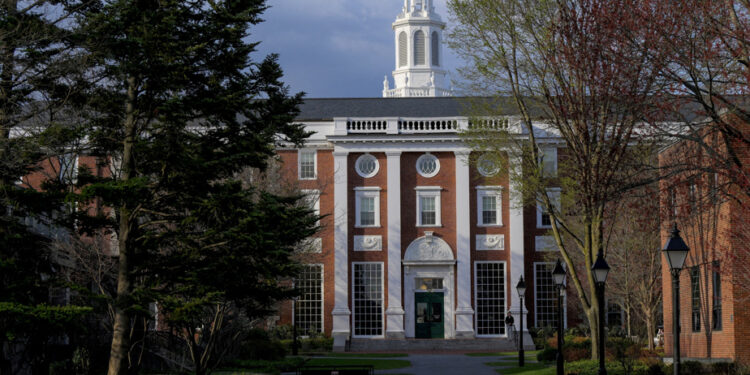(Boston) Harvard University will appear on Monday before a federal court to argue that the Trump administration illegally reduced its budget by US 2.6 billion. It is a turning point in the battle of this prestigious university against the American federal government.
If the district judge Allison Burroughs decides in favor of the university, this decision will cancel a series of financing gels, which then turned into pure and simple budget cuts, the Trump administration intensifying its conflict with the oldest and richest university in the country.
Such a decision, if it is maintained, would revive the vast scientific and medical research network of Harvard and hundreds of projects that have lost federal funds.
“This case highlights government efforts to use the blocking of federal funding as a lever to take control of academic decisions in Harvard,” the university said in its complaint.
“In summary, the compromise imposed on Harvard and other universities is clear: allowing the government to micride your university establishment or compromise its ability to carry out medical advances, scientific discoveries and innovative solutions. »»
A second legal action concerning the budget cuts, brought by the American association of university professors and its Harvard section, was attached to that of the university.
Harvard’s complaint accuses the administration of President Donald Trump of having carried out a reprisal campaign against the university after his rejection of a series of requests made in a letter of April 11 from a federal working group on anti -Semitism.
The letter required radical changes concerning event demonstrations, study programs and admissions. For example, she asked Harvard to check the points of view of students and teachers and admit more students or hire new teachers if the campus did not present diversified points of view.
The document was aimed at responding to the accusations of the government that the university had become a home for liberalism and tolerated anti-Jewish harassment on the campus.
Harvard president Alan Garber is committed to fighting anti -Semitism, but said that no government “should dictate to private universities what they can teach, which they can admit and hire, and what areas of study and research they can continue”.
The same day Harvard rejected these requests, government officials decided to freeze US 2.2 billion in research grants. The Secretary of Education, Linda McMahon, said in May that Harvard would no longer be eligible for new grants, and a few weeks later, the administration began to cancel the contracts with Harvard.
While Harvard challenged the freeze in the courts in court, agencies began to send letters announcing the end of research grants that were frozen. They invoked a clause allowing the suppression of subsidies if they no longer comply with government policies.
Harvard, who has the most important wealth in the country, with 53 billion US, has decided to self -finance part of his research, but warned that she could not absorb the full cost of the federal cuts.
In court documents, the university indicated that the government “does not explain how the end of funding for cancer treatment, support for veterans and improving national security responds to anti -Semitism”.
The Trump administration denies that these cuts were operated on in retaliation, saying that subsidies were being studied before the sending of the April formal notice. It argues that the government has a large discretionary power to cancel contracts for political reasons.
“Under the Trump administration, the United States policy is not to finance establishments that do not adequately deal with anti-Semitism in their programs,” she said in court documents.
Funding for research is only one of the fronts of Harvard’s fight against the federal government. The Trump administration has also sought to prevent the university from welcoming foreign students, and Donald Trump threatened to revoke Harvard tax exemption.
Finally, last month, the Trump administration officially rendered a judgment supporting that the university had tolerated anti -Semitism – a measure which could ultimately compromise the entire federal funding of Harvard, including the federal loans and scholarships. This sanction is generally described as “death sentence”.



